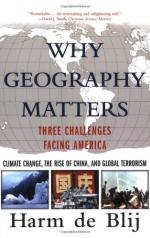|
This section contains 827 words (approx. 3 pages at 400 words per page) |

|
Why Geography Matters: Three Challenges Facing America Summary & Study Guide Description
Why Geography Matters: Three Challenges Facing America Summary & Study Guide includes comprehensive information and analysis to help you understand the book. This study guide contains the following sections:
This detailed literature summary also contains Topics for Discussion and a Free Quiz on Why Geography Matters: Three Challenges Facing America by Harm de Blij.
Why Geography Matters: Three Challenges Facing America was written by Harm de Blij, a Dutch-born geographer who has taught geography at US universities for half a century. De Blij identifies these three major challenges as being the rising power of China, climate change, and global terrorism; however, he also recognizes that there are many other potential challenges to the US. Using physical and cultural geography, de Blij explains the reasons for many of the planet's problems and offers solutions. Through his focused discussion of the three major threats, de Blij provides vital historical data about the geologic development of the planet, global warming, the development of the human race, the planet's soaring population, the rise and fall of significant empires, and the root and future of Islamic terrorism.
As Earth approaches a population of seven billion, the people of the planet face numerous challenges. For the United States, the three major challenges in the next fifty years will be climate change, the rise of China, and global terrorism. Although these challenges will be significant and will not be the only challenges the US faces, if the people of the US and its government are prepared to deal with them, they can be addressed. In the past, from Vietnam to Islamic terrorism, the US has either demonstrated an inability to understand the situation, or has been poorly prepared to deal with such issues.
The threat of climate change is real but it is not new. For millions of years the Earth has experiencing warming and cooling periods and the current warming period is just another episode in that long series. The Earth is currently in an ice age, but we have been experiencing the Holocene interglaciation (a period of warming within an ice age) for about the past 12,000 years. Scientists expect that eventually the interglaciation will end and the ice will return to much of the planet's surface. No one knows for sure when this will happen, and once it happens, there is little human action that can reverse it. In the meantime, however, no one knows what the impact of human activities such as pollution and the greenhouse effect will be on the length of the interglaciation, so limiting human impact on the planet is advisable. Once the Earth begins to cool, climates will change and shift. Many of the inhabited polar regions, especially in the northern hemisphere, will no longer be able to sustain human life and most of today's agricultural zones will become too cold to be agriculturally viable, so food production will shift to lower latitudes and may be severely limited. With seven billion people on Earth, these new limitations on space and agriculture may cause severe problems for the people of Earth.
In the past 25 years, China has transformed from a relatively quiet, isolated agrarian culture into a major economic force with a massive military complete with nuclear weapons, and its huge 1.3 billion population. As China continues to flex its muscle, issues between the US and China may arise, particularly over territory is Southeast Asia. Since the ending of World War II, the US has had a strong presence in Asia; however, in recent years, it has begun to reduce its military presence. Without the balancing influence of the US, China may use military power to regain former territories such as Taiwan, or to expand its boundaries in order to accommodate its ever-increasing population. That population will also place a huge demand on global resources, particularly on oil and gas. As reserves in the Middle East continue to dwindle, the need for these resources may also lead to military conflicts in regions such as Russia, where oil and gas is still plentiful. There is a great risk that a new cold war, this time between the US and China, will develop. However, this cold war will between two cultures with very few commonalities, which may increase the risk of fatal misunderstandings. The American public would be wise to learn more about China and its culture in an effort to minimize cultural misunderstandings and intolerance.
For Americans, global terrorism didn't become a true reality until the 9/11 terrorist attack. Since that time, Americans have shared the global communities' long held fear of terrorism. Terrorism is nothing new; it's been used as a political tool for centuries. However, this newest wave of terrorism, Islamic extremism, is far more frightening than previous forms. Because Islamic terrorists seem to have no specific objective other than terrorizing, it is a major challenge for the world. However, because terrorism breeds in failing or malfunctioning societies, there are ways to prevent its expansion and intervene before it is too late. As failing states increase in numbers, it is vital to global security that the world community ensures stability and hope in these failing states before fear, frustration, and poverty enable terrorists to recruit these victims into their realm of terror and expand their threat to the world.
Read more from the Study Guide
|
This section contains 827 words (approx. 3 pages at 400 words per page) |

|



